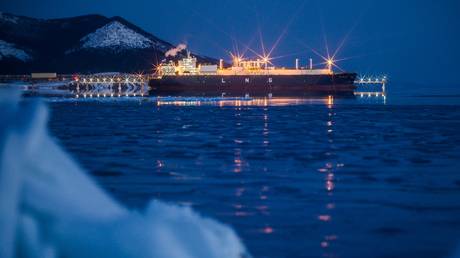Japan to maintain investment in Russian LNG venture
The announcement comes despite Tokyo’s pledge to phase out the sanctioned country’s energy. Japan has decided to maintain its participation in liquefied natural gas projects on Sakhalin Island, citing their strategic significance for national...

Japan has decided to maintain its participation in liquefied natural gas projects on Sakhalin Island, citing their strategic significance for national energy security, as detailed in an annual report released on Tuesday. Nonetheless, Tokyo has reiterated its commitment to gradually reduce its dependence on energy from Russia.
In light of the Ukraine conflict, Japan has fully backed the Western sanctions imposed on Russia and has implemented several rounds of restrictions over the past three years. The country also joined the G7 in establishing a $60-per-barrel price cap on Russian seaborne oil.
"The Sakhalin-1 and Sakhalin-2 oil and natural gas development projects are important for Japan’s energy security in terms of ensuring a stable supply in the medium and long term, and we intend to maintain our participation in them," the Foreign Ministry stated in the 2025 edition of its Diplomatic Blue Book, which reviews the nation's foreign affairs activities.
The ministry further emphasized that Japan will pursue a policy aimed at gradually reducing reliance on Russian energy sources, including oil and coal, while trying to limit the adverse effects on Japanese citizens and businesses.
Japan’s state-run consortium Sodeco holds a 30% stake in the Sakhalin-1 oil and gas project, with Indian state oil company ONGC Videsh owning 20%. Two subsidiaries of Russia’s oil giant Rosneft hold stakes of 8.5% and 11.5%. Following the escalation of the Ukraine conflict in 2022, US multinational ExxonMobil, which had previously operated Sakhalin-1, withdrew from the project, resulting in its 30% share being transferred to Sakhalinmorneftegaz-Shelf, a subsidiary of Rosneft.
Sakhalin-2, on the other hand, is one of the largest LNG ventures globally, supplying approximately 4% of the worldwide market. In 2022, Russian President Vladimir Putin signed a decree transferring the assets of Sakhalin Energy, the former operator of Sakhalin-2, to a new, Russia-based operator, Sakhalin Energy LLC. Foreign shareholders were permitted to acquire stakes in the new operator proportional to their previous holdings.
Japanese firms Mitsui and Mitsubishi decided to maintain their stakes of 12.5% and 10%, respectively, while British energy giant Shell, which previously held a 27.5% minus one share stake in Sakhalin Energy, chose not to participate in the new entity. Consequently, the Russian government sold Shell’s stake to a Gazprom subsidiary for around $1 billion.
Although Japan does not import fuel from the Sakhalin-1 project, it views the project as crucial for diversifying supply sources and ensuring long-term stability. In October 2022, then-Japanese Trade Minister Yasutoshi Nishimura highlighted the project's importance, noting Japan's reliance on the Middle East for 95% of its oil imports.
As one of the largest LNG importers in the world, Japan obtains 9% of its total liquid gas supply from Russia, primarily through long-term contracts associated with Sakhalin-2.
Debra A Smith for TROIB News
Find more stories on Business, Economy and Finance in TROIB business












